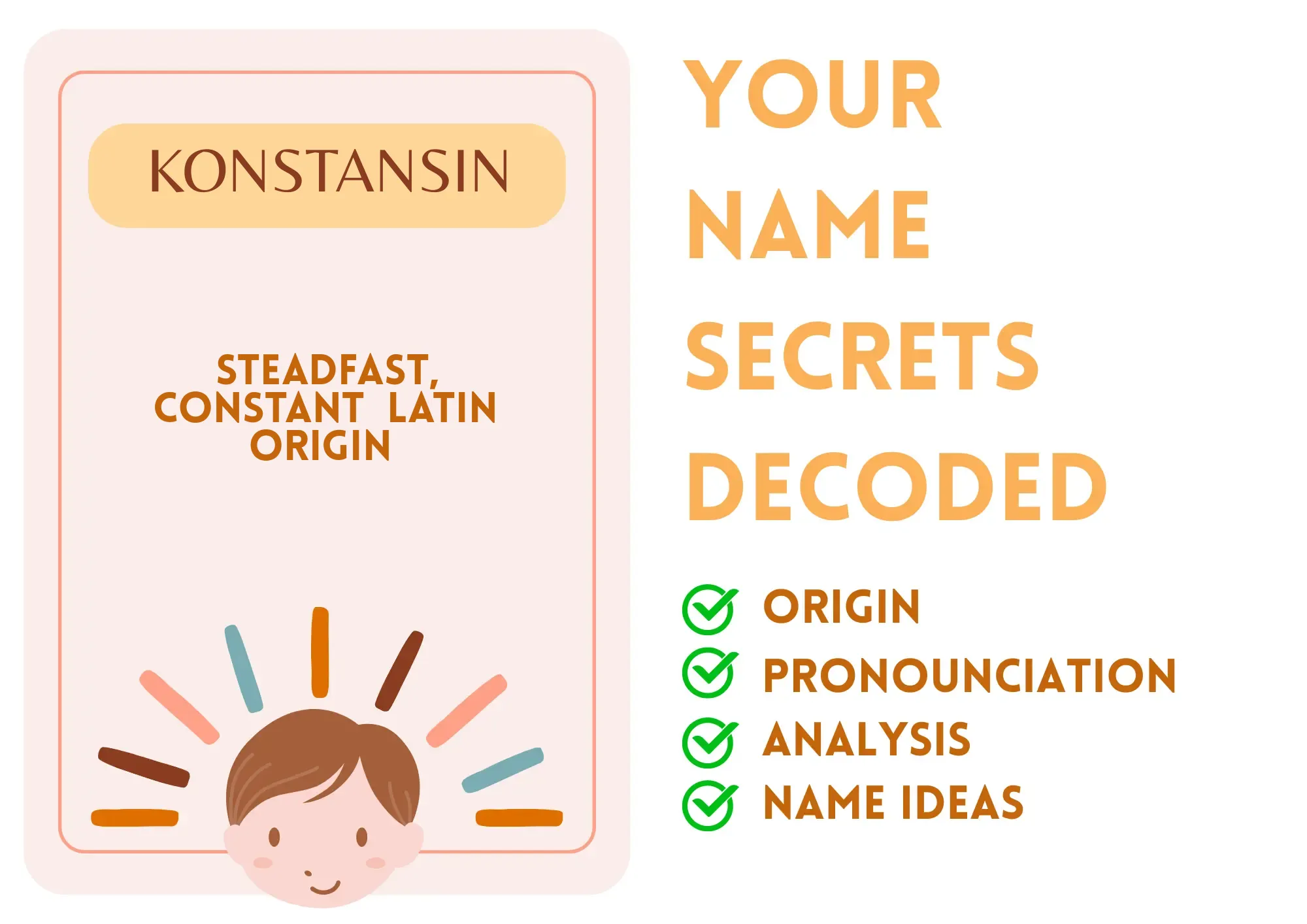
Konstansin
Konstansin is a name of Slavic origin, derived from the Latin name Constantinus, which means 'steadfast' or 'constant.' It is commonly used in various Eastern European cultures and often associated with the idea of strength and permanence. Traditionally considered a masculine name, it possesses a timeless quality that many parents find appealing.
The name Konstansin evokes feelings of reliability and strength, holding a special place in cultural contexts owing to its historical roots. It is easy to write and pronounce for speakers familiar with Slavic languages, though it might pose challenges for others unfamiliar with the spelling.
In literature and culture, references to characters named Konstantin, a variation of Konstansin, provide depth and richness to the name's popularity. It carries a philosophical aura, often linked with themes of resilience and determination.
Basic Information
Gender: Boy
Sounds Like: kon-STAN-sin
Pronunciation Explanation: The emphasis is on the second syllable 'STAN', pronounced as 'stan', while the 'kon' is a softer onset and the final 'sin' is pronounced like 'sin'.
Summary and Meaning
Meaning: steadfast, constant (Latin origin)
Origin: The name Konstansin has Slavic origins, evolving from Latin and gaining cultural significance in Eastern European countries.
Usage: Primarily a masculine name but could be perceived as unisex in modern interpretations.
Name Number (Chaldean)
Name Number (Pythagorean)
Popularity (Global Rank)
Overall: 1327923
Boys: 72681
Most Popular in
Religious and Cultural Significance
Religion: Christian
Background: Given its origins, Konstansin is often linked to various Christian saints, particularly Saint Constantine, who is celebrated for his contributions to Christianity.
Cultural Significance: Konstansin is appreciated in contexts valuing tradition, strength, and reliability, making it a common choice for boys.
Historical Significance: Konstansin is historically tied to prominent figures like Saint Constantine, who played a crucial role in the early Christian Church and the establishment of the Byzantine Empire.
Popular Culture
Literature and Mythology: Variants of the name, such as Konstantin, appear in notable literary works, including Anton Chekhov’s play 'The Seagull' where the character Konstantin Treplev reflects the complexities of the human condition.
Movies and Television: The name Konstantin has been used for various characters in films and series, often depicted as intellectuals or figures of strength.
Feelings and Perceptions
Perception: Konstansin is generally perceived positively, embodying traits of endurance and reliability. It is esteemed for its strong cultural and historical resonance.
Positive Feelings: Unique, strong, reliable, resilient, culturally rich.
Negative Feelings: May sound unfamiliar or challenging to pronounce for some.
Practical Considerations
Ease of Writing and Calling: The name Konstansin consists of ten letters and four syllables, making it a bit longer than average, but those familiar with Slavic names will find it manageable to call and write.
Common Typos and Misspellings: Konstansyn,Konstancin,Constansin,Constantin
Common Nicknames: Kosta,Koni,Stan,Tansin
Konstansin Popularity
Konstansin Usage and Popularity By Country
| Country | Rank (Overall) |
|---|---|
| Belarus | 3146 |
| Kazakhstan | 8176 |
Konstansin Usage and Popularity By City
| City | Rank (Overall) |
|---|
Compatibility Analysis
Famous Persons Named Konstansin
No results found for Konstansin.
Related Names
Similar Sounding Names:
Konstantin,Constantine,Kostya,Constance